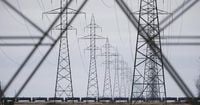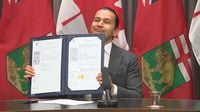WINNIPEG — In a significant shift in energy policy, Manitoba Premier Wab Kinew announced on April 14, 2025, that the province will not renew two hydroelectric contracts with a Minnesota utility, effectively repatriating 500 megawatts of power for domestic use. This decision comes amid ongoing trade tensions between Canada and the United States, as Kinew emphasized the need to prioritize Manitoba's energy needs and bolster local economic growth.
The contracts, signed in 2010 with Northern States Power, part of Xcel Energy, are set to expire at the end of April 2025. They involve the sale of 375 megawatts of summer power (325 megawatts during winter) and 125 megawatts of annual power. Kinew stated, "We’ve decided, as Canadians and Manitobans, we are going to use that power to build up our own economy here at home," highlighting the potential for increased housing and industrial development.
Manitoba Hydro, the provincial Crown corporation, confirmed that it had no plans to renew these contracts, which Kinew described as a move to reclaim energy resources for the benefit of Manitobans. "We saw that there’s 500 megawatts of export contracts that are expiring at the end of the month, and so we’ve decided... to use that power to build up our own economy here at home," he added during a press conference at the Manitoba Legislative Building.
Despite this shift, Kinew reassured that Manitoba would continue to engage in electricity trade with the U.S., stating, "We’re still going to be good partners, and reliable partners, for our American export market." The province plans to allocate 50 megawatts of the repatriated power for a potential transmission line to Nunavut, which aims to connect remote communities and reduce dependence on diesel fuel.
The Kivalliq Hydro-Fibre Link project, which is in its early stages, seeks to build a 1,200-kilometre transmission line with fibre-optic cabling to connect Manitoba’s grid to the Kivalliq region of Nunavut by 2032. Kinew expressed optimism about the project, stating, "We’re showing that we’re serious, bringing a tangible commitment to standing up one of these trade corridors." Representatives from Nunavut are expected to sign an agreement with the province on April 16, 2025, to advance this initiative.
However, the decision to repatriate power has drawn criticism from the Opposition Progressive Conservatives, who raised concerns about the financial implications for Manitoba Hydro, which is currently burdened with a $25 billion debt. Critics argue that the shift may negatively impact Hydro's bottom line, especially as the utility faces a $31 billion tab for upgrading aging infrastructure. Energy critic Lauren Stone questioned whether Kinew fully considered the long-term costs of this decision, stating, "I think he needs to be candid with Manitobans as to what this is actually going to cost Manitoba ratepayers down the line."
Manitoba Hydro has applied for a series of three annual electricity rate hikes of 3.5 percent, beginning in 2026, to address its financial challenges. The utility has also warned that it may face capacity limits as early as 2029 during peak winter months, making the repatriation of power even more critical.
Kinew's announcement aligns with a broader context of increasing scrutiny over energy trade agreements amid escalating tariffs and trade disputes between Canada and the U.S. The province's decision to redirect hydro exports from the U.S. to support domestic projects reflects a growing sentiment among Canadian leaders to enhance sovereignty over natural resources.
Additionally, Kinew has indicated a willingness to explore opportunities for developing trade corridors that could facilitate energy distribution across Canada, stating, "We know that those trade corridors are going to need power." The premier's vision includes not only the Kivalliq Hydro-Fibre Link but also potential partnerships with Indigenous-owned businesses to develop wind farms, further diversifying Manitoba’s energy portfolio.
As the province navigates this transition, Kinew remains committed to honoring existing contracts with U.S. utilities. "When we say we are going to keep our word, we do exactly that," he affirmed, reassuring stakeholders of Manitoba Hydro's reliability as a partner in energy trade.
Amid these developments, Kinew's administration is also focused on addressing the environmental impact of energy production. By repatriating hydroelectric power, the province aims to reduce reliance on fossil fuels and promote cleaner energy alternatives, which aligns with broader climate goals.
The decision has sparked discussions about the future of energy policy in Manitoba and its implications for the province's economy. As Kinew leads the charge in redefining energy exports, the potential for increased local investment and job creation remains a focal point of his administration.
In conclusion, Manitoba's decision to repatriate hydroelectric power reflects a strategic pivot towards self-sufficiency and economic resilience. As the province prepares to harness its energy resources for domestic benefit, the unfolding developments surrounding the Kivalliq Hydro-Fibre Link and other initiatives will be closely monitored by both supporters and critics alike.








